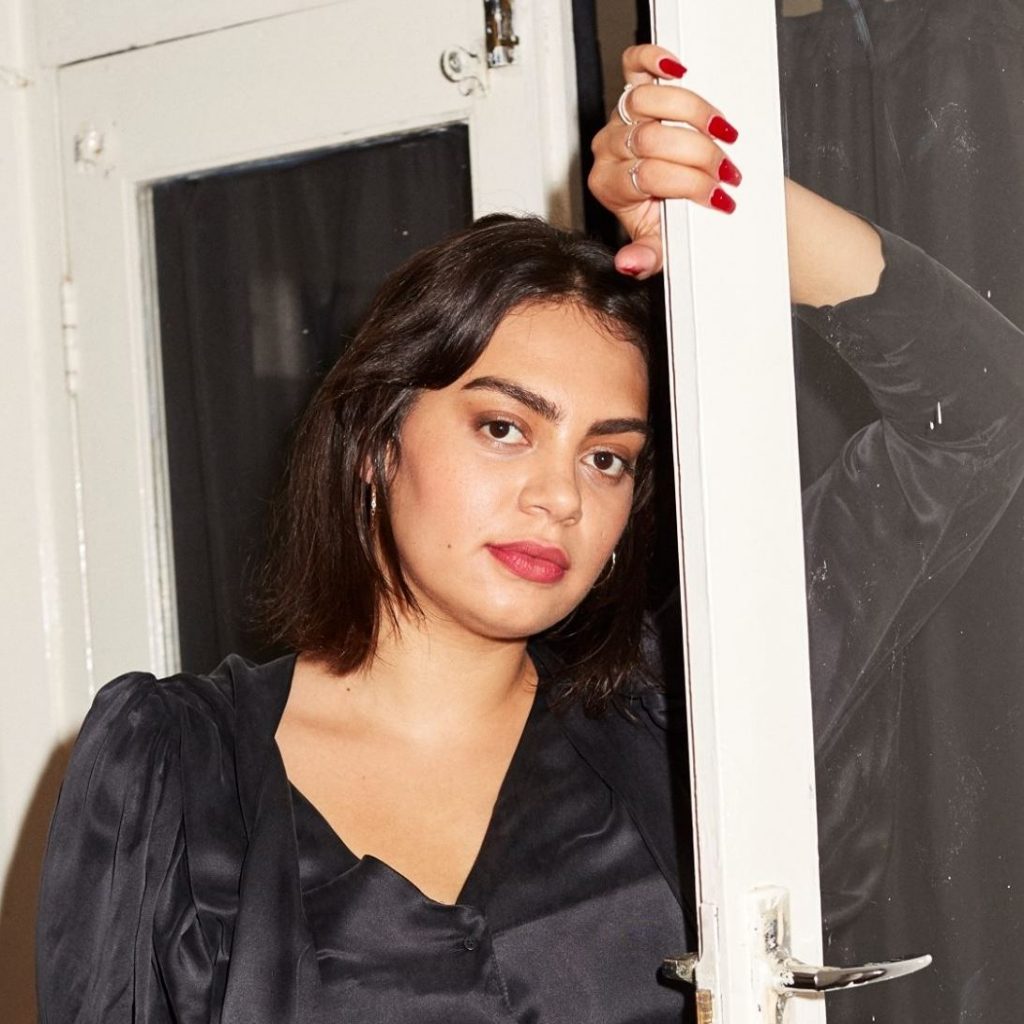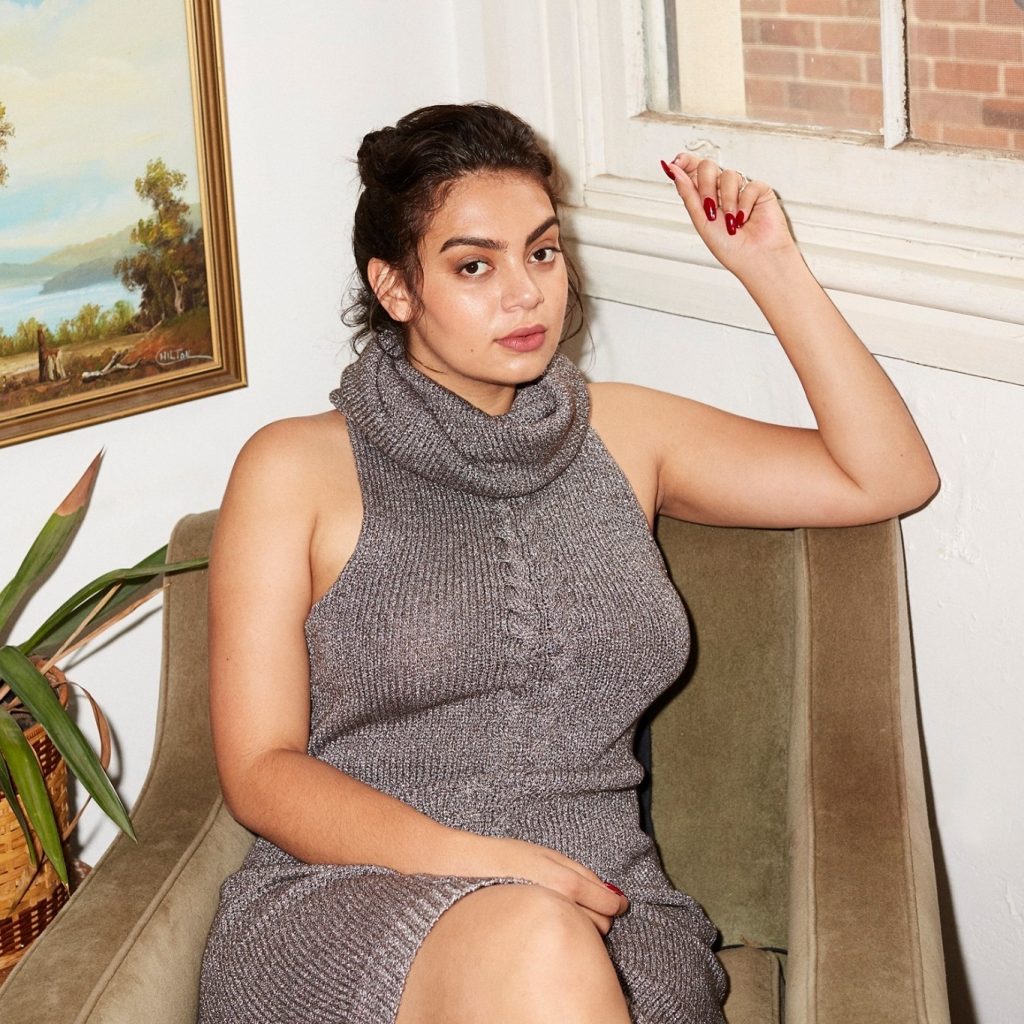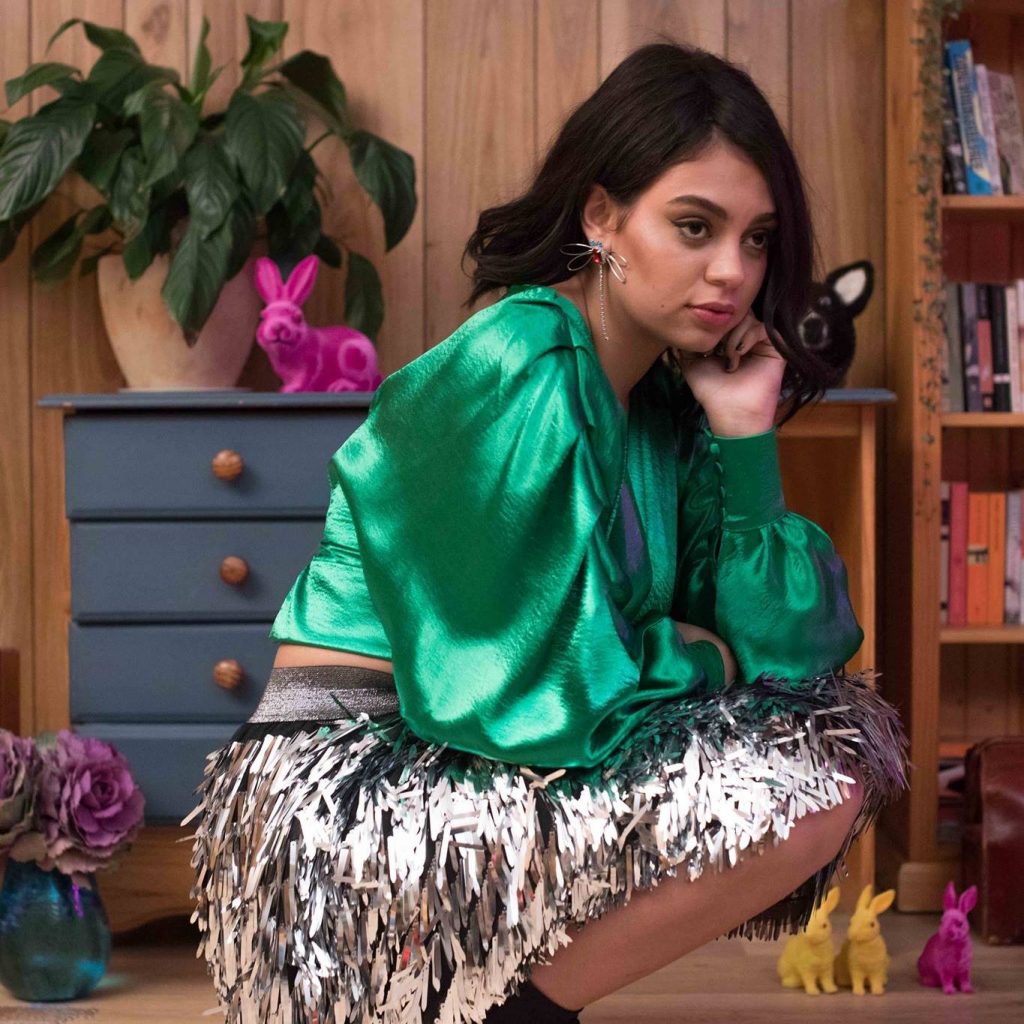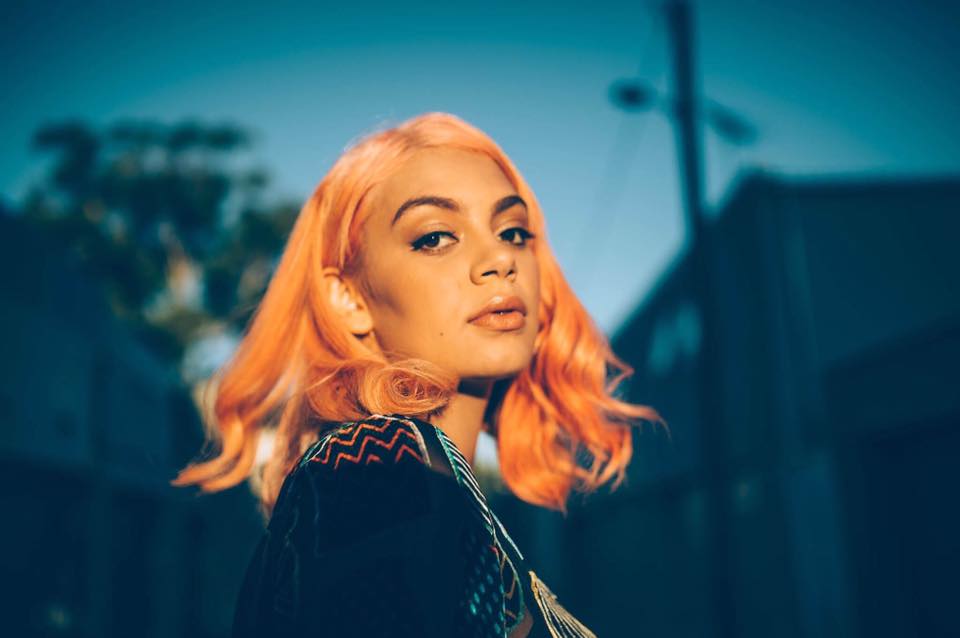There’s an alternate timeline out there somewhere where Thelma Plum made a different album.
She’s still sitting in this same Surry Hills cafe. She’s still older and wiser than the teenager that first emerged in the early 2010s with songs like the tender ‘Father Said’ and the expletive joy of ‘Round Here.’
She’s still an accomplished, acclaimed performer that has worked with some of the biggest names in Australian music — all the while pushing as a contender to become one herself. The album she’s getting interviewed to promote, however, isn’t Better in Blak. Truth be told, she doesn’t know what that album would be called — mainly because, even after completing it, the whole thing was ultimately scrapped.
“Life just… gets in the way sometimes,” Plum sighs. She’s detailing the creative process of Better in Blak, but in order to tell that story, she needs to acknowledge the abandoned work from two years prior. “I got to the start of last year, and all those songs were already a year old. I had changed so much in the year prior, and I felt like I was selling myself short. I had to write about these experiences. I had to start again.”
“It was hard, because I worked just as hard on that record. I sunk a lot of hours into making it happen. At the end of the day, though, I knew that this was my first record. It was going to be the first time, hopefully, that a lot of people heard my music. I wanted to be true to it, and I wanted to be true to myself. I wanted it to represent who I am now, and not who I was a few years ago.”

Photo via Facebook
With that in mind, one can view Better in Blak through the framework of it being Plum having open conversations about — and with — her younger self. A song like ‘Homecoming Queen’ details her ingrained body image issues, never feeling truly beautiful due to not seeing herself in any women that frequented the pages of her magazines.
“You don’t realise how much it can affect you,” she says. “I always loved watching film clips on TV, reading magazines and looking at beautiful women. It really skewed my idea of whether I was beautiful or not. I had to teach myself how to love myself, because I didn’t have that around me. I had it from my mum, and I had it from my family, but not from the TV. I know it sounds so silly, but it really does something to you when you see nobody that looks like you. You start to think, ‘What’s wrong with me?’”
“I was writing this record when I was coming out of a very dark place. Once I was able to write it down and articulate how I was feeling, it was like therapy.”
There’s also ‘Nick Cave,’ a song Plum originally wrote and started playing around 2014 that somehow survived cull after cull and stood firmly as a live fan favourite for years. Contrary to its title, it’s not directly about the man himself — rather, it’s about a teenage Plum listening to him purely to impress her crush, who happened to idolise him.
“It wasn’t like I needed to fill up space on the record,” says Plum of its inclusion. “I never stopped playing that song. I feel like it’s a real throwback — it could have been on my first EP, Rosie.”
With these acknowledgements of “the old Thelma,” so to speak, it drives home just how much the 25-year-old has already been through prior to the creation of Better in Blak. When she talks about the album, the word “healing” comes up more than once.
“I was writing this record when I was coming out of a very dark place,” Plum says. “Once I was able to write it down and articulate how I was feeling, it was like therapy. I could acknowledge how I was feeling, and bring myself out of that dark place. There’s absolutely no way you can bring yourself out from there if you don’t acknowledge how you’re feeling in the first place. You can’t just say, ‘Oh, I’ll be fine,’ and just press through pretending you are. It doesn’t work that way.”
One might suggest that there is a degree of cognitive dissonance at play, given that there are co-writers present on many of Better in Blak‘s songs that are explicitly direct and autobiographical. Purists might see the inclusion of outside voices and perspectives on what is meant to be a soliloquy of sorts as defeating the purpose entirely.
The reality of it, however, is far removed from that perception. Both Plum and her co-writers were working towards the exact same goal in serving the song itself — and, from a creative standpoint, they completely achieved it. Take Plum’s work with erstwhile Sparkadia frontman Alex Burnett, for instance.
“I love him so much,” Plum enthuses about the acclaimed songwriter. “I’ve never had such a connection with another songwriter before. I don’t even know exactly what it is, honestly. Between the two of us, there’s a real trust in one another and what we’re able to do. Every day I would come to the studio with him, and I’d go through what I wanted to do — ‘I want to sing about this,’ or ‘I want to sing about that.’ If I was writing with someone I didn’t trust as much as I do Alex, then I probably wouldn’t do that. I’d hold my ideas and my thoughts a little closer to the chest. Whenever I wrote with Alex, he made it really easy.”
Plum also co-wrote a song with Gang of Youths frontman David Le’aupepe called ‘Love and War,’ in which he also takes a verse. It’s the only credited feature on the album, and a special moment that Plum wanted to share with a man who has been nothing but supportive of her since their paths first crossed. “I met those boys years ago through Kurt [Bailey], their manager,” says Plum. “You’re just so taken aback when you see them play — you’re in awe of them. You can see there’s something very special about them.”

Photo via Facebook
“There was definitely a real sense of comfort in writing with another brown person. We had similar experiences growing up, and I feel it’s something we really bonded over. I have wanted to write with Dave for the longest time, and I’m so grateful that we were able to make that happen. I’m so grateful I got to do that.”
Despite the collaboration ultimately bearing fruit — ‘Love and War’ is one of the album’s true highlights — Plum is the first to admit that their initial attempts didn’t entirely go to plan.
“The night we got into the studio, we were feeling pretty flat,” she says. “The night before, Four Corners had done the program with the Don Dale boys. I think everyone in the country that time was feeling very angry, and feeling a lot of shame. It was a dark day for Australia. I’ve known about these injustices for a long time, but it was the first time it had been broadcast to the Australian mainstream.
“I think everyone in the country that time was feeling very angry, and feeling a lot of shame. It was a dark day for Australia.”
“There was a heavy feeling in the air, and it felt strange. We didn’t address it directly, but I knew there was a disconnect in having that in the back of my mind and then going, ‘Alright, let’s write a banger!’”
Despite the emotions running as high as their collective exhaustion, Plum and Le’aupepe channelled what they were feeling into something constructive. “We wrote about how we were feeling at the time,” says Plum. “We drew from the story, and that song was what came out of it — and I’m really proud of it.”
Better in Blak is an album about growth and growing up as it is self-acceptance and self-love. There’s an air of fiery defiance on the album’s title track, when Plum casually lobs the phrase “fuck that” to rhyme with the phrase “If I knew what I knew now/Maybe I would take it back.”

Photo via Facebook
No retreat, no surrender — that’s Thelma Plum circa 2019. It certainly hasn’t always been this way, though. The path to Plum having a full grasp of who she is and what she stands for is one filled with twists and turns, and more than a few rough patches.
“I just had so much anger for so long about so many different things,” she says. “I hated how I was treated — even growing up, none of my school friends were allowed to sleep over at my house because I was the little Aboriginal kid with the single mum. When things like that happen your whole life, it makes you angry. It took me a while to come to the realisation that it was not my fault. It’s not because I’m not worthy, or that I’m not good enough. It’s only in the last few years that I’ve been able to come to that conclusion.”
“It took me awhile to come to the realisation that it was not my fault. It’s not because I’m not worthy, or that I’m not good enough.”
It’s not lost on her that the second single for the album was a song literally called ‘Not Angry Anymore’: “I’m still learning/How to stop and let it go/All the feelings start to show.”
Plum laughs when questioned as to how true a statement like that titular phrase is within the luxurious confines of a pop song.
“Of course anger doesn’t just go away,” she says. “I think now, though, I know where to place it — whereas even a couple of years ago, I didn’t. More often than not, I would place it on myself. I don’t do that anymore. Self-care is important — not just pampering yourself, but taking care of your mental health and holding myself accountable. For me, that’s a really big thing. I have a tendency to get quite sad, and it’s something I always have to be on top of. I’m more aware of it. Thanks to making this album, I have a better understanding of what I’m feeling and why I’m feeling that way.”

Photo via Facebook
Although Plum herself has learned more about the complex state of her own emotional landscape, it’s clear that her detractors have not. ‘Better in Blak’ opens with a lyric that’s rhetorical, but also impossible to answer even if it wasn’t: “Do you know what it’s like/To get calls in the middle of the night/Saying ‘you’re not worth it’?/’You deserve it’?”
Earlier this year, while performing on tour as a part of Groovin’ the Moo, Plum was sent threatening messages via Instagram just hours before going on stage.
“Some boys had taken another band’s merch, and they’d written ‘FUCK THELMA PLUM’ on it,” she recalls. “It was pretty scary. They were sending me all of these photos, and I saw it just as we were preparing for our set. I’ve had boys like this come to my shows before, and make me feel really unsafe. I thought they might try and attack me or bottle me — we had to have security on-stage with us while we were playing. It’s a pretty shitty feeling, fearing for your own safety while you’re on stage trying to perform. How could you want to do something like that to someone that you don’t even know?”
In spite of their attempts to break Plum’s spirit, she recalls pushing through the set and it ended up being one of the best performances she gave across the entire Groovin run. “It was me using what I’d learned to take control of the situation,” she says. “Funnily enough, after everything, it ended up being a great show. I ended up getting an apology from one of the ringleaders behind the whole thing, but it doesn’t take away from what you’ve done.”
“It’s a pretty shitty feeling, fearing for your own safety while you’re on stage trying to perform. How could you want to do something like that to someone that you don’t even know?”
Plum immediately rolls into discussing the trolls she’s had to deal with — almost exclusively white, straight, cis private schoolboys, who eventually transmogrify into men that set their profile pictures as them holding up a fish they just caught (Briggs calls them “Angler Saxons”). “When you’re someone who’s unapologetic, who calls shit out and forces people to look at their own behaviour, it makes people uncomfortable,” she says.
“People don’t like feeling uncomfortable. What I will never understand, though, is why people are so angry at me. They seem so radicalised. It’s scary — not just for me, but for the fact that they’re out there still.”
If Better in Blak is reflective of anything, though, it’s the fact that they won’t win. They can’t win — not while Plum is still fighting for survival on the frontlines, making a stand and living well as the best revenge. She hopes that this is an album that is seen, heard and felt — by those that support her, by those that don’t and by those that might find solace in what Plum sings about.
“There’s a part of me that hopes that whoever needs to hear this album hears this album,” she says. “If there’s a little Aboriginal girl out there who hears my music or sees me live, and she sees that I look like her and that she could do this too.”
She pauses; the weight of her words catching up to her.
“That truly would make me feel like I’ve done something really great.”
Thelma Plum’s debut album Better in Blak is out July 12 via Warner Music Australia.
David James Young is a writer and podcaster. Normally he adds something witty to this part, but this time around he just really wants you to listen to this record. Visit www.davidjamesyoung.com for more.


